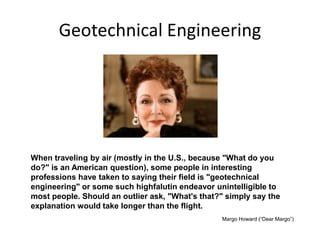6 Simple Techniques For Geotheta
6 Simple Techniques For Geotheta
Blog Article
The smart Trick of Geotheta That Nobody is Talking About
Table of ContentsThe 5-Minute Rule for GeothetaThe 45-Second Trick For GeothetaNot known Facts About GeothetaSome Ideas on Geotheta You Should KnowGeotheta Can Be Fun For Everyone

They conduct site investigations, accumulate examples, execute lab examinations, and examine information to examine the viability of the ground for building projects - Geo Tech Engineer. Based upon their findings, geotechnical designers provide referrals for structure layout, incline stability, maintaining frameworks, and mitigation of geotechnical risks. They team up with various other professionals, such as architects, structural designers, and building teams, to ensure that geotechnical factors to consider are integrated right into the general job style and application
By evaluating the habits and properties of dirt and rock, they can recognize prospective geotechnical risks such as landslides, dirt settlement, or incline instability. Their expertise assists prevent failings or crashes that could jeopardize lives and residential property. Right here are some detailed duties and responsibilities of a geotechnical engineer: Site Investigation: Geotechnical designers conduct website examinations to collect data on subsurface problems.
They interpret the data to understand the homes and habits of the soil and rock, including their stamina, leaks in the structure, compaction characteristics, and groundwater conditions. Geotechnical Analysis and Style: Geotechnical designers examine the information accumulated throughout site investigations to examine the security and suitability of the site for construction projects. They perform geotechnical estimations and modeling to assess variables such as bearing capability, negotiation, incline stability, side planet stress, and groundwater circulation.
Geotheta Things To Know Before You Get This
Foundation Style: Geotechnical engineers play a critical duty in developing structures that can securely support the designated framework. They analyze the soil problems and lots demands to determine the appropriate foundation kind, such as shallow structures (e.g., grounds), deep foundations (e.g (https://www.intensedebate.com/people/geotheta)., heaps), or specialized methods like soil enhancement. They consider factors such as negotiation restrictions, bearing ability, and soil-structure interaction to establish optimum structure designs
They review building and construction strategies, display site activities, and carry out area evaluations to confirm that the style suggestions are complied with. If unpredicted geotechnical issues occur, they examine the circumstance and supply recommendations for remediation or modifications to the style. Risk Analysis and Mitigation: Geotechnical designers evaluate geotechnical dangers and threats connected with the project website, such as landslides, liquefaction, or soil erosion.

Partnership and Interaction: Geotechnical designers work carefully with other professionals associated with a project, such as engineers, structural engineers, and construction teams. Efficient communication and cooperation are important to incorporate geotechnical considerations into the general project design and building and construction process. Geotechnical engineers offer technical proficiency, response queries, and make certain that geotechnical demands are met.
The Ultimate Guide To Geotheta
Right here are some sorts of geotechnical designers: Read More Here Structure Engineer: Foundation engineers concentrate on designing and evaluating structures for structures. They evaluate the soil problems, load needs, and website features to identify the most ideal foundation type and layout, such as superficial structures, deep foundations, or specialized techniques like pile foundations.
They evaluate the factors affecting slope security, such as dirt properties, groundwater problems, and slope geometry, and develop techniques to stop slope failures and mitigate risks. Earthquake Designer: Earthquake designers concentrate on analyzing and making frameworks to withstand seismic forces. They evaluate the seismic hazard of a website, review dirt liquefaction potential, and develop seismic design requirements to make certain the safety and security and strength of structures throughout earthquakes.
They do area testing, collect samples, and assess the gathered data to characterize the dirt buildings, geologic developments, and groundwater problems at a site. Geotechnical Instrumentation Engineer: Geotechnical instrumentation engineers concentrate on surveillance and measuring the actions of soil, rock, and structures. They mount and maintain instrumentation systems that keep an eye on aspects such as dirt negotiation, groundwater levels, incline activities, and structural displacements to evaluate efficiency and offer very early cautions of potential concerns.
The Best Strategy To Use For Geotheta
They carry out tests such as triaxial examinations, loan consolidation examinations, direct shear tests, and permeability examinations to gather information for geotechnical analysis and design. Geosynthetics Designer: Geosynthetics engineers specialize in the style and application of geosynthetic products, such as geotextiles, geogrids, and geomembranes. They use these products to enhance soil security, strengthen inclines, supply drain solutions, and control disintegration.
They have a tendency to be investigatory individuals, which suggests they're intellectual, reflective, and analytical. They are curious, methodical, sensible, analytical, and rational. Some of them are likewise social, suggesting they're kind, charitable, participating, client, caring, useful, compassionate, tactful, and pleasant - Geotechnical Engineers.
In the workplace environment, geotechnical designers utilize specialized software program tools to carry out estimations, develop designs, and analyze data. They prepare reports, evaluation job requirements, communicate with customers and employee, and coordinate job activities. The workplace setup offers a conducive environment for study, evaluation, and cooperation with various other specialists associated with the project.
Geotheta Things To Know Before You Get This
They often check out job websites to conduct site examinations, assess geotechnical conditions, and collect information for analysis. These brows through involve traveling to different locations, sometimes in remote or tough terrains. Geotechnical engineers may execute dirt sampling, conduct examinations, and display building activities to guarantee that the geotechnical aspects of the project are being implemented properly.
Geotechnical designers also function in specialized geotechnical labs. In these facilities, they conduct experiments, do tests on soil and rock samples, and evaluate the engineering buildings of the products. Geotechnical laboratory engineers work thoroughly in these settings, handling testing equipment, operating tools, and taping data. They collaborate with other research laboratory staff to guarantee exact and trustworthy screening results.
Report this page